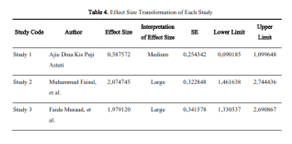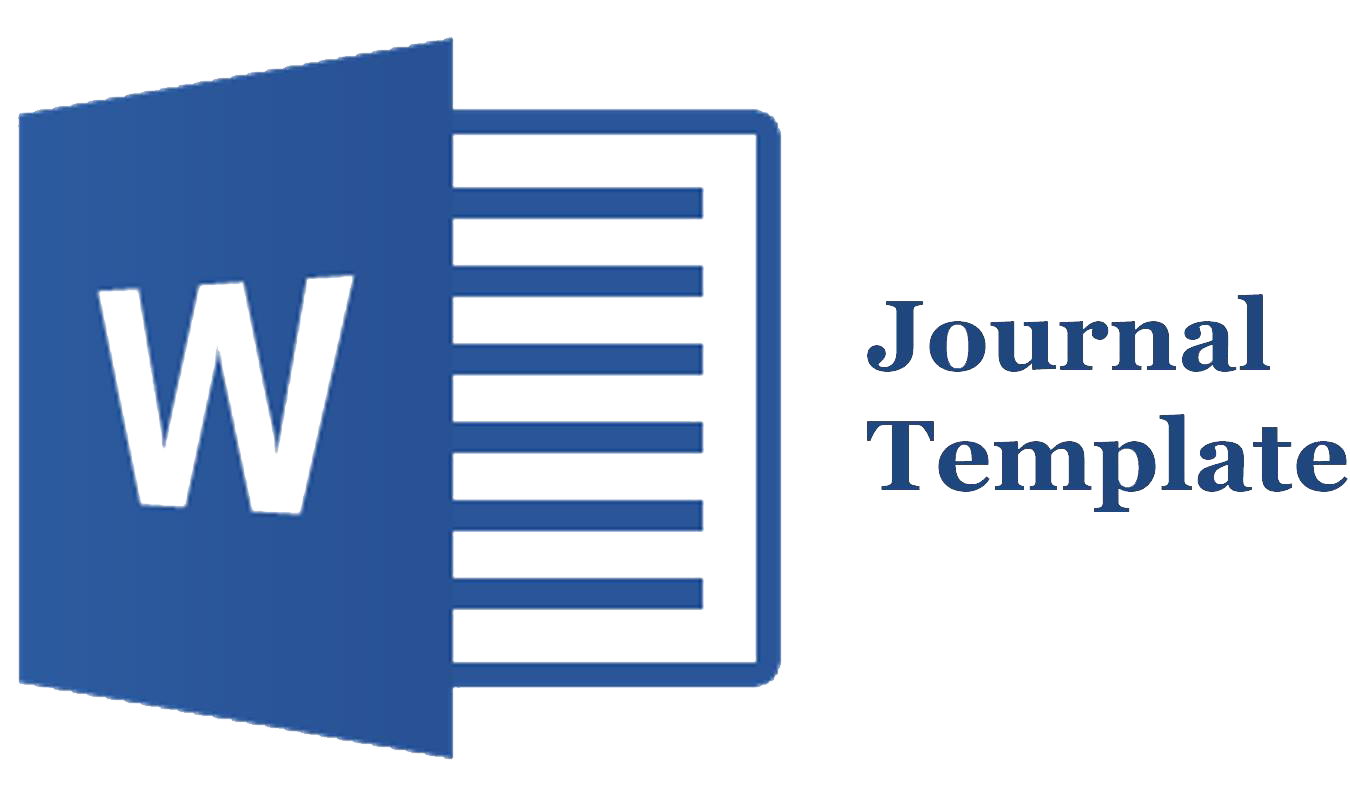SYSTEMATIC LITERATURE REVIEW: THE EFFECT OF LEARNING MODEL ON STUDENTS’ MATHEMATICAL LITERACY SKILLS
Abstract
Mathematical literacy is an important competency that needs to be developed by students in learning mathematics. This study aims to analyze the effect of various learning models on students' mathematical literacy using a quantitative approch to Systematics Literature Review (SLR) with a meta-analysis method. Data were collected through a literature review of relevant articles on mathematical literacy published between 2019 and 2024. The inclusion criteria for the primary study used in this meta-analysis research include the population in the primary study includes students at the junior high school and senior high school levels; the treatments given to the experimental groups are PBL, PJBL, DL, Blended Learning, Flipped Classroom, SIMAS ERIC, RME, PBI, Creative Problem Solving, and CTL, while the treatment given to the control group is the Conventional Learning Model; the outcome in the primary study is mathematical literacy; the type of research is quasi-experimental; statistical data available in the primary study includes sample size, mean, and standard deviation; and the publication year of the primary study is between 2019 and 2024. Of the 80 articles identified, 20 nationally accredited journal articles met the inclusion criteria and were further analyzed using the https://meta-analysis.com/ software to obtain a pooled effect size. The meta-analysis results showed that the implementation of various learning models had a significant impact on improving students' mathematical literacy skills. The study also analyzed several study characteristics, including the year of the study, education level, learning model, and sample size. Statistically, it was found that students' mathematical literacy improvement was influenced by the level of education and the type of learning model applied, with some learning models showing stronger effects depending on students' education level.
Keywords:
Mathematical Literacy, Learning Model, Meta AnalysisDownloads
References
Amelia, I., Syamsuri, S., Santosa, C. A. H. F., & Fatah, A. (2022). Meta Analisis: Pengaruh Model Pembelajaran Terhadap Kemampuan Literasi Matematis Siswa. Jurnal Cendekia : Jurnal Pendidikan Matematika, 6(2), 1720–1730. https://doi.org/10.31004/cendekia.v6i2.1410
Aritonang, I., & Safitri, I. (2021). Pengaruh Blended Learning Terhadap Peningkatan Literasi Matematika Siswa. Jurnal Cendekia : Jurnal Pendidikan Matematika, 5(1), 735–743. https://doi.org/10.31004/cendekia.v5i1.555
Astria, R., Haji, S., & Sumardi, H. (2023). Pengaruh Model Pembelajaran Project Based Learning Terhadap Kemampuan Literasi Matematis Siswa Di SMA Negeri 6 Kepahiang. RANGE: Jurnal Pendidikan Matematika, 5(1), 106–117. https://doi.org/10.32938/jpm.v5i1.4710
Astuti, A. D. K. P. (2020). Pengaruh Problem Based Learning Terhadap Kemampuan Literasi Matematis Siswa Kelas VII Di SMP Negeri 1 Bobotsari. AlphaMath : Journal of Mathematics Education, 4(2), 37. https://doi.org/10.30595/alphamath.v4i2.7359
Aula, M. F. R., Suyitno, H., & Rosyida, I. (2019). Mathematical Literacy Ability Viewed From Student’s Learning Style Based on Gender Differences on PBL Assistance Project Assessment. Unnes Journal of Mathematics Education Research, 8(1), 2019–2096. http://journal.unnes.ac.id/sju/index.php/ujmer
Cohen, L., Manion, L., & Morrison, K. (2007). Research Methods in Education. https://doi.org/https://doi.org/10.4324/9780203029053-23
Cooper, H. M., Valentine, J. C., & Hedges, L. V. (2017). Handbook of Research Synthesis and Meta-Analysis 2nd Edition. In The Lancet (Vol. 389, Issue 10082).
Faisal, M., Dhoruri, A., & Mahmudah, F. N. (2024). Pengaruh Model Pembelajaran Problem Based Learning Terhadap Kemampuan Literasi Matematika. AKSIOMA: Jurnal Program Studi Pendidikan Matematika, 13(2), 577–585.
Fatwa, V. C., Septian, A., & Inayah, S. (2019). Kemampuan Literasi Matematis Siswa melalui Model Pembelajaran Problem Based Instruction. Mosharafa: Jurnal Pendidikan Matematika, 8(3), 389–398. https://doi.org/10.31980/mosharafa.v8i3.575
Fitriani, & Lubis, E. M. S. (2022). DENGAN PENDIDIKAN KARAKTER UNTUK MENINGKATKAN LITERASI MATEMATIKA dan keterampilan matematika diberbagai situasi dan konteks yang berbeda dalam kehidupan. Dirasatul Ibtidaiyah, 2(2), 269–280.
Fritz, C. O., Morris, P. E., & Richler, J. J. (2012). Effect size estimates: Current use, calculations, and interpretation. Journal of Experimental Psychology: General, 141(1), 2–18. https://doi.org/10.1037/a0024338
Hayati, M., & Jannah, M. (2024). Pentingnya kemampuan literasi matematika dalam pembelajaran matematika. Griya Journal of Mathematics Education and Application, 4(1), 40–54. https://doi.org/10.29303/griya.v4i1.416
Hia, O. M., Mendrofa, R. N., & Zega, Y. (2024). Pengaruh Model Pembelajaran Discovery Learning Terhadap Kemampuan Literasi Matematis Siswa. Indo-MathEdu Intellectuals Journal, 5(2), 1752–1761. https://doi.org/10.54373/imeij.v5i2.280
Komala, E., & Erma Monariska. (2023). Penerapan Pendekatan Realistic Mathematics Education (RME) untuk Meningkatkan Literasi Matematis dan Mereduksi Kecemasan Matematis Siswa. Hexagon: Jurnal Ilmu Dan Pendidikan Matematika, 1(1), 68–74. https://doi.org/10.33830/hexagon.v1i1.4919.
Mansur, N. (2018). Melatih Literasi Matematika Siswa dengan Soal PISA. Prisma, Prosiding Seminar Nasional Matematika. 1, 140–144. https://journal.unnes.ac.id/sju/index.php/prisma/
Muharomah, N. N., & Setiawan, E. (2020). Penerapan Model Pembelajaran Problem Based Learning Untuk Meningkatkan Kemampuan Literasi Matematis Siswa Smp. Union: Jurnal Pendidikan Matematika, 8(3), 389–400. https://doi.org/10.31949/dmj.v1i2.1291
Musaad, F., Trisnawati, N. F., Rusani, I., Sundari, S., & Setyo, A. A. (2023). Pengaruh Model Problem Based Learning Untuk Meningkatkan Kemampuan Literasi Matematika Pada Materi Penyajian Data. AXIOM : Jurnal Pendidikan Dan Matematika, 12(2), 218. https://doi.org/10.30821/axiom.v12i2.17966
Mutiasari, F., Susanta, A., & Muchlis, E. E. (2024). Pengaruh Model Pembelajaran Problem Based Learning Konteks Budaya Bengkulu Terhadap Kemampuan Literasi Matematika Siswa Smpi Al-Azhar 52 Kota Bengkulu. Jurnal Lebesgue : Jurnal Ilmiah Pendidikan Matematika, Matematika Dan Statistika, 5(2), 844–850. https://doi.org/10.46306/lb.v5i2.621
OECD. (2017). PISA 2015 Assessment and Analytical Framework: Science, Reading, Mathematic, Financial Literacy and Collaborative Problem Solving (Revised Edition). In OECD Publishing.
Ornawati, V., Hendrastuti, Z. R., & Franita, Y. (2023). Pengaruh Model Pembelajaran Problem Based Learning Terhadap Kemampuan Literasi Matematis Ditinjau Dari Gaya Belajar Siswa Smp. Delta: Jurnal Ilmiah Pendidikan Matematika, 11(1), 45. https://doi.org/10.31941/delta.v11i1.2438
Pernandes, O., & Asmara, A. (2020). Kemampuan Literasi Matematis Melalui Model Discovery Learning di SMP. Jurnal Pendidikan Matematika Raflesia, 5(1), 140–147. https://ejournal.unib.ac.id/index.php/jpmr
Pramita, D., & Maysarah, S. (2024). Pengaruh Model Pembelajaran Flipped Classroom Terhadap Kemampuan Literasi Matematis Dan Kemandirian Belajar Matematis Siswa. Euclid, 11(3), 162–176. https://doi.org/10.33603/e.v11i3.8969
Pratiwi, A., & Tita Rosita, N. (2024). Penerapam Model Problem Based Learning untuk Meningkatkan Kemampuan Literasi Matematis Siswa. Suska Journal of Mathematics Education, 10(1), 39–46. http://dx.doi.org/10.24014/sjme.v10i1.30176
Putri, N. S., Juandi, D., & Jupri, A. (2022). Pengaruh Model Pembelajaran Kooperatif Tipe Think-Talk-Write terhadap Kemampuan Komunikasi Matematis Siswa: Studi Meta-Analisis. Jurnal Cendekia : Jurnal Pendidikan Matematika, 6(1), 771–785. https://doi.org/10.31004/cendekia.v6i1.1264
Ralmugiz, U., & Kusumawati, M. (2020). Efektivitas Pendekatan Realistic Mathematics Education Dalam Meningkatkan Kemampuan Literasi Matematis Siswa. Math Educa Journal, 4(2), 169–178. https://doi.org/10.15548/mej.v4i2.1819
Retnawati, H., Apino, E., Kartianom, Djidu, H., & Anazifa, R. D. (2018). Pengantar Analisis Meta. In Yogyakarta : Parama Publishing (Issue July).
Rohana, R., Hartono, Y., & Nugraha, I. A. (2021). Pengaruh Model Pembelajaran Creative Problem Solving Terhadap Kemampuan Literasi Matematis Siswa SMA. Indiktika : Jurnal Inovasi Pendidikan Matematika, 3(2), 169–179.
Sari, E. P., Anggoro, B. S., & Dewi, N. R. (2022). Pengaruh Model Simas Eric Terhadap Kemampuan Komunikasi Matematis Dan Literasi Matematis. Laplace : Jurnal Pendidikan Matematika, 5(2), 200–213. https://doi.org/10.31537/laplace.v5i2.759
Soraya, D. (2022). Pengaruh Model Realistic Mathematics Education (RME) Terhadap Kemampuan Pemecahan Masalah Soal Cerita Matematika Siswa Kelas Ii Sd Negeri 03 Pelan. 6(1), 1–104. http://prosiding.unipma.ac.id/index.php/KID/article/view/2831
Tabun, H. M., Taneo, P. N. L., & Daniel, F. (2020). Kemampuan Literasi Matematis Siswa pada Pembelajaran Model Problem Based Learning (PBL). Edumatica : Jurnal Pendidikan Matematika, 10(01), 1–8. https://doi.org/10.22437/edumatica.v10i01.8796
Tamur, M., Juandi, D., & Kusumah, Y. S. (2020). The effectiveness of the application of mathematical software in indonesia; a meta-analysis study. International Journal of Instruction, 13(4), 867–884. https://doi.org/10.29333/iji.2020.13453a
Widiastuti, E. R., & Kurniasih, M. D. (2021). Pengaruh Model Problem Based Learning Berbantuan Software Cabri 3D V2 terhadap Kemampuan Literasi Numerasi Siswa. Jurnal Cendekia : Jurnal Pendidikan Matematika, 5(2), 1687–1699. https://doi.org/10.31004/cendekia.v5i2.690
Yunita, W., Huda, N., & Syaiful, S. (2024). Pengaruh Penerapan Model Contextual Teaching and Learning (CTL) dan Problem Based Learning (PBL) Terhadap Kemampuan Literasi Numerasi di SMP. Jurnal Cendekia : Jurnal Pendidikan Matematika, 8(2), 1510–1521. https://doi.org/10.31004/cendekia.v8i2.3250

Published
How to Cite
Issue
Section
License
Copyright (c) 2025 Huliyatun Nazmihaolah, Salsa Nabila, Nani Ratnaningsih

This work is licensed under a Creative Commons Attribution-ShareAlike 4.0 International License.







